IT Fraud Lawyers
We will listen to your concerns and help you understand your options.
We will listen to your concerns and help you understand your options.
The U.S. government relies on information technology (IT) to provide services and protection to its citizens. It uses computers, storage systems, and networks to create, process, store, secure, and exchange all forms of electronic data, and it depends on the IT industry to provide much of the technology.
Unfortunately, some IT providers cheat American taxpayers by making false claims to the government when providing these systems and services. Information technology frauds against the government can include:
If you have observed an IT provider taking any of these actions, you may be in the position to report this fraud and receive a whistleblower reward for your efforts. Consult with a computer fraud attorney, cybersecurity lawyer, or whistleblower attorney about your suspicions.
Contact Carolina Whistleblower Attorneys today and let us guide you on how best to protect you and your job as you seek to hold IT providers accountable for dishonest practices that cost the government (and ultimately taxpayers) millions of dollars.
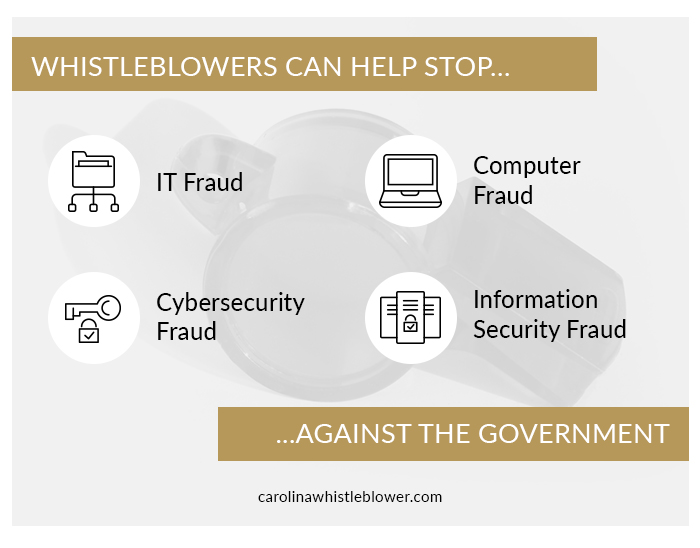
The Department of Justice (DOJ) announced a 2021 Civil Cyber-Fraud Initiative to use the False Claims Act (FCA) to combat new and emerging cyber threats in today’s increasingly interconnected and digital world. The DOJ committed to “pursue misrepresentations by companies in connection with the government’s acquisition of information technology, software, cloud-based storage and related services designed to protect highly-sensitive government information from cybersecurity threats and compromises.”
Individuals can blow the whistle on dishonest IT cybersecurity service providers by reporting on fraudulent practices, such as:
As part of the FCA, a private citizen can report cybersecurity IT fraud against the government and sue on the government’s behalf in a qui tam lawsuit. If the lawsuit is successful, the whistleblower can receive up to 25% of the government’s recovery. A cybersecurity attorney or information security attorney experienced in whistleblower laws can help you with this process.
IT companies that profit off making false claims to the government should be held accountable. Fortunately, there are brave individuals who are willing to report illegal behavior – even when it means filing a lawsuit on behalf of the government. Following are several examples of IT companies who have been accused of breaking the rules when dealing with the government and the prices they paid.
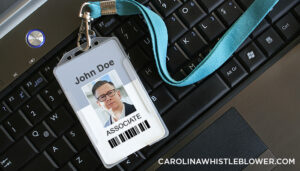
Telecom software and services company Computer Sciences Corp. and its subcontractor NetCracker Technology Corp. agreed to pay $1.35 million and $11.4 million, respectively, to resolve allegations that NetCracker hired individuals without security clearances on a Defense Information Systems Agency (DISA) contract.
From 2008 through 2013, NetCracker allegedly knew the contract required hiring individuals to have security clearances, thus resulting in the company recklessly submitting false claims for payment. The civil lawsuit was filed by a former NetCracker employee who received approximately $2.4 million as his share of the recovery in this case.1
Cisco Systems and Westcon Group North America paid a $48 million settlement to settle FCA allegations that they made contract misrepresentations to the General Services Administration (GSA) and other federal agencies that resulted in defective pricing of Cisco IT products. As part of the settlement, the government agreed to dismiss a whistleblower lawsuit.
In another alleged scheme, Cisco agreed to pay an $8.6 million settlement to resolve allegations that it knowingly sold security surveillance technology that did not comply with basic cybersecurity controls set forth by the National Institute of Standards and Technology to federal, state, and local government agencies.
This alleged breach exposed the agencies’ systems to the risk of unauthorized access and data manipulation. The whistleblower, a Cisco distribution partner employee, filed a qui tam lawsuit under the False Claims Act claiming that Cisco knowingly sought payment for a system that put agency security at risk and received approximately 20% of the settlement as a whistleblower reward.1
Accenture LLP agreed to pay approximately $64 million to settle allegations that it submitted false claims to several federal agencies for payment for IT services, received kickbacks for recommending hardware and software to the government, and engaged in bid-rigging on federal information technology contracts. The two whistleblowers who filed the qui tam lawsuit against Accenture were accounting executives of Accenture and PricewaterhouseCoopers, and they received approximately $14 million as their whistleblower reward.1
IT company EMC Corporation paid $87.5 million to settle a lawsuit alleging that it violated the FCA, as well as the federal Anti-kickback Act, in contract negotiations with the GSA. The U.S. government alleged that the claim made by EMC – that it would conduct price comparisons to ensure that the GSA received the lowest price provided to its commercial customers – was false.
In addition, the same two whistleblowers who prevailed in the above Accenture case also filed a whistleblower/qui tam lawsuit claiming that EMC engaged in an illegal kickback scheme by paying fees to consulting companies in exchange for EMC product recommendations to influence the government’s purchasing decisions.1
If you believe you have seen an IT company stealing from and/or cheating the government, call Carolina Whistleblower Attorneys at 1-888-292-8852 as soon as possible. We can provide guidance on how, and if, you should report the behavior. It’s important to act quickly, because generally the first person who files a whistleblower claim has the greatest chance of collecting a reward if the suit is successful.
While anyone can report IT fraud, you need a lawyer to file a whistleblower lawsuit under the FCA. A lawyer can also fight to protect you from retaliation and claim a reward, if the case is successful.
Our attorneys have helped whistleblowers stop fraud against the government.1 We have also counseled individuals who do not have strong cases on other avenues for reporting the misconduct. We won’t take a case that we don’t think we can win. And we won’t accept any payment from you unless you get a reward. Said differently, if you don’t get a reward, you owe us nothing.2
For more information on how we guide potential whistleblower clients, check out our You-First Policy. We respect whistleblowers who want to ensure that the IT fraudsters are held accountable for their actions. We can help you as we have helped many others.
“Bill has the ability to ‘think outside the box’…which makes him extremely effective as an advocate for his clients.” 1 — Attorney who previously worked with Bill
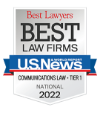
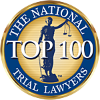


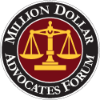
If you’re wondering if it’s a good idea to speak with a whistleblower lawyer about what you know, let us set the record straight.
"*" indicates required fields